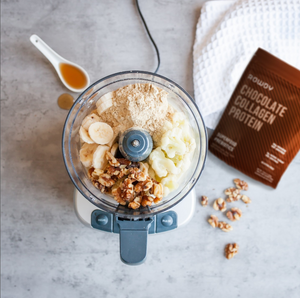There are many myths and misconceptions surrounding the topic of human health. When it comes to what you should be eating, everyone has an opinion on what’s best for your body. You’ve probably heard of cholesterol, and it’s commonly known that having high cholesterol is a risk factor for many health problems such as heart disease, diabetes and stroke.
But aside from acknowledging the link that eating excess fats in our diets leads to a rise in cholesterol levels in the body, how much do you know about cholesterol?
Here are three facts which help shine a clearer light on this complex topic.
There’s two types – and they’re both essential
Cholesterol is a lipid, as are fats. But there is so much bad hype around fat that it’s easy to assume all types are bad for us. Cholesterol is a naturally occurring lipid produced by the liver, which helps your body to make cell membranes, vitamin D and aids the production of hormones. All the body’s cells need a certain amount of cholesterol, so it’s not an inherently bad substance.
The liver is capable of making all of the cholesterol that your body needs, and it is transported throughout the body by lipoproteins of two types; LDL (low-density lipoproteins) and HDL (high-density lipoproteins).
- LDLs deposit cholesterol around the body, but if there’s too many of them, deposits can build up in our arteries, increasing the risk of heart disease. But it isn’t ‘bad’ like it’s often advertised, we need LDL to ferry cholesterol to our nerves and cells so they can function properly.
- HDLs are the cleaning service that runs through the blood and transports excess LDLs back to the liver to be disposed of, protecting our body tissues from build up of cholesterol.
Eating too many foods high in saturated fats and sugar can cause our LDL levels to rise and our HDL levels to drop. And as cholesterol cannot be burned off or used for energy in the same way that other fats we eat can be, it can lead to raised LDL levels in the blood and cause an array of health problems.
High cholesterol can be genetic
People assume high cholesterol always means a poor diet, but this isn’t the case. Some people are simply predisposed to having higher levels of LDL and high cholesterol due to their genetics. Familial hypercholesterolemia is such a condition, which can mean your body is less able to process additional cholesterol consumed from eating animal products.
In fact, the latest scientific research shows that there may not be as big of a link between diet and high cholesterol as previously thought. Many foods that are high in cholesterol producing fats are also highly nutritious, so cutting them out entirely may not be the best idea.
However, if you already have high cholesterol, eating certain foods such as avocado, nuts, legumes and soy based foods can help to naturally rebalance cholesterol levels and reduce the amount of LDLs in your blood.
Exercise increases HDL levels
Although we are steering away from labelling any cholesterol as ‘bad’, we can agree that HDLs are the ones we want more of in our blood. Aside from eating well, working out is a great way to boost your cholesterol clean up crew into action. Research shows that high intensity interval training and breaking a sweat can help to raise HDL levels and lower LDLs in both men and women.
Maintaining a healthy body weight is also a very helpful way to keep your cholesterol levels correct, as excess weight in the abdominal region is associated with lower HDL levels. Managing your body fat is also a great way to reduce the risk of heart disease and diabetes, especially if you naturally have higher cholesterol.
If you struggle to do high-impact activity, swimming is a powerful exercise that will not only help lower your cholesterol but also protect your joints whilst still getting a great cardio workout.
Of course, it’s always best to discuss your health with a professional if you are concerned about your diet, weight or cholesterol levels. Prevention is the best cure when it comes to health problems such as heart disease, so it’s best to be proactive and try to live as healthily as possible.


